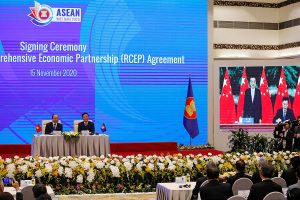PARTICIPATION in the Regional Comprehensive Economic Partnership (RCEP) is a government priority, Trade Secretary Alfredo E. Pascual said on Thursday.
“RCEP is a priority of the administration. We have clarified this in one of our Cabinet meetings,” Mr. Pascual said during the general membership meeting of the Management Association of the Philippines (MAP) in Taguig City.
RCEP, a trade deal which started coming into force on Jan. 1, involves Australia, China, Japan, South Korea, New Zealand and the 10 members of the Association of Southeast Asian Nations (ASEAN). It is billed as the world’s largest trade agreement as it represents about 30% of global gross domestic product.
However, the entry of Philippines into RCEP failed to obtain Senate in the 18th Congress after some senators expressed concern over the lack of protections for the agriculture industry. It is now up to the 19th Congress to decide on ratification. The first day of the new session is July 25.
“(The) Department of Trade and Industry (DTI) will continue to push for the immediate ratification of the RCEP and other trade agreements. With only 10 FTAs, the Philippines has the least number of FTAs among the ASEAN six countries,” Mr. Pascual said.
“Singapore signed 27 FTAs, Malaysia 17, Thailand 15, Indonesia 15, and Vietnam 15. These agreements will diversify the country’s exports in terms of products and services and destinations and enhance the country’s attractiveness to foreign investment,” he added.
Mr. Pascual added that the Philippines will not become an attractive location for export-oriented enterprises without RCEP and FTAs.
“Most foreign investments in China, for instance, are export-oriented industries. They are from big multinationals having transferred their production facilities to China and using China as a production place. Without these FTAs and RCEP, the Philippines would not be an attractive location for such types of export-oriented enterprises,” Mr. Pascual said.
President Ferdinand R. Marcos, Jr. has said he wants an assessment of the RCEP to ensure the protections for the agriculture sector. — Revin Mikhael D. Ochave
